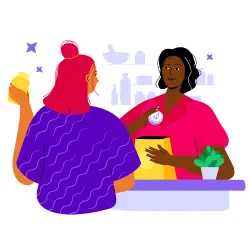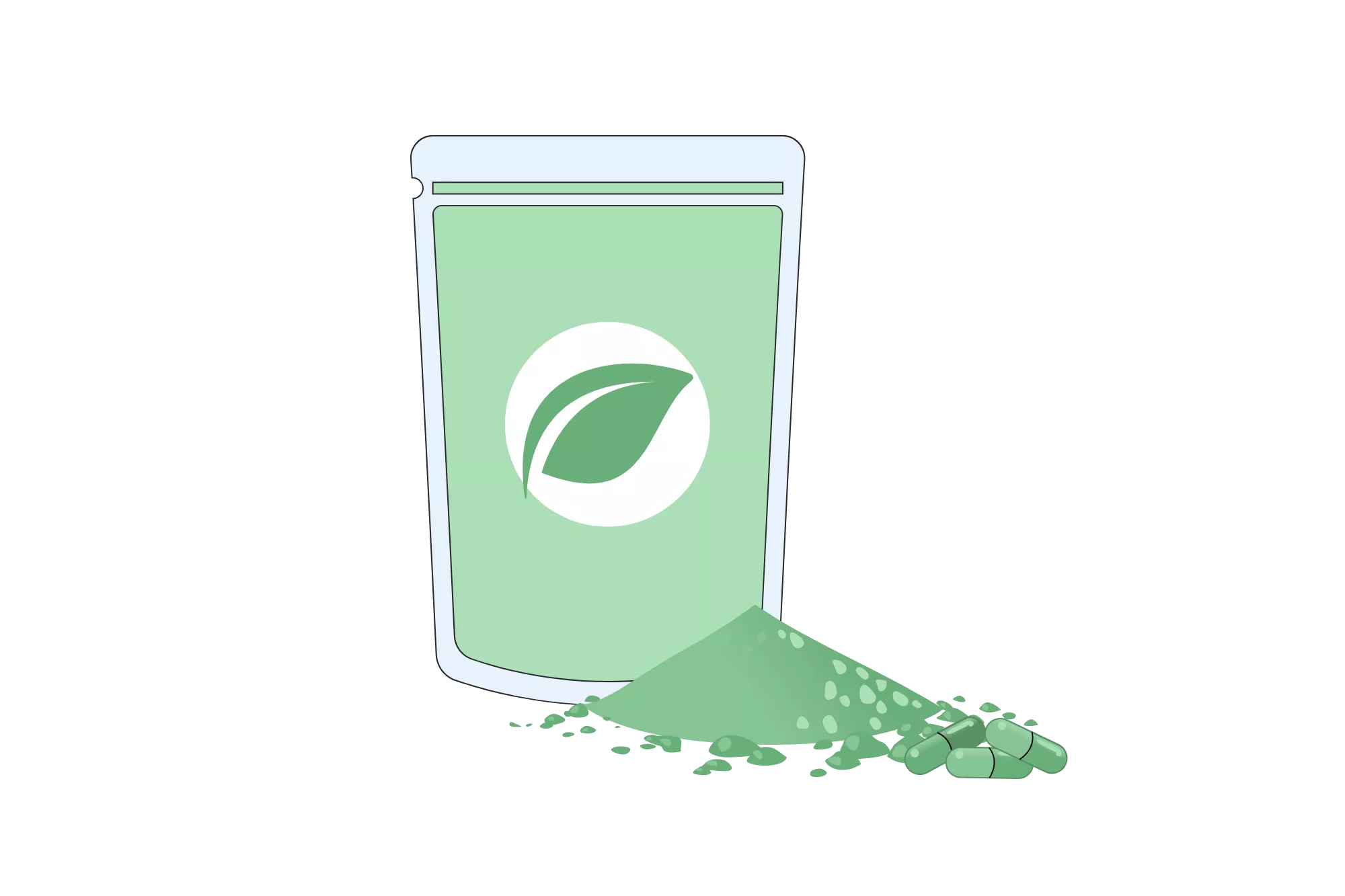
Kratom, CBD, and Kava are all similar, ancient herbal remedies used for various health and wellness applications, namely pain, sleeplessness, and anxiety. However, each comes from a different plant source, has slightly different use cases, and is subject to different regulatory restrictions.
Read on to learn more about these herbal supplements and how they can be safely bought and sold in the United States.
What Is Kratom and What are the Benefits?
Kratom comes from an evergreen tree in the coffee family native to Southeast Asia called Mitragyna Speciosa. For centuries, its leaves have been chewed or brewed into tea to be used to treat pain. In small doses, it can combat sleepiness. In larger doses, it can be used for relaxation. It’s also said to suppress appetite, help with panic attacks, ease cramps and stop diarrhea. As a natural, over-the-counter treatment, it can manage opioid withdrawal and addiction.
Today kratom is mainly sold in powdered form, capsules, or as an ingredient in other substances like caffeine or energy drinks.
What does Kratom do?
Kratom’s active ingredients are the alkaloids mitragynine and 7-hydroxy mitragynine. Both interact with opioid receptors in the brain. This means the compounds reduce feelings of pain in the body and increase feelings of pleasure. Common benefits include pain relief, anti-anxiety, and anti-depression.
Pain Relief
Since Kratom is a natural medicine that triggers opioid receptors, it may reduce pain. The active ingredients found in Kratom have been proven to relieve any discomfort or inflammation you may be experiencing.
Ant-anxiety
As these active ingredients reach opioid receptors, they may also act as a sedative. Users feel an anti-anxiety feeling when taking Kratom.
Anti-depression
It has also been reported that Kratom has mood-changing effects and will give users a euphoric feeling. In low doses, kratom can act as a stimulant, making users feel more energetic and talkative.
Others claim kratom can help a number of other conditions like panic attacks, cramps, arthritis, and constipation.
Is Kratom Safe?
There’s much disagreement about kratom’s safety. Its supporters believe kratom is a valuable and safe drug that doesn’t warrant restriction. It’s a popular substance currently used by many around the world.
Many countries around the world ban its sale and use, including Australia and countries in Europe and Southeast Asia. In 2022, the FDA issued the public a warning against kratom.
For this reason and more, many health experts believe self-medicating with kratom is risky. Anyone looking to try Kratom for themselves should check with their doctor first and use the lowest therapeutic dose as sparingly as possible to avoid any ill effects.
Potential Side Effects of Kratom
As with many pain medications, at high doses or over a long period of time, stopping kratom’s use can cause withdrawal symptoms, much like opioids. In particular, kratom seems to cause unwanted side effects when taken with other drugs and prescription medications. Side effects can include:
- Weight loss
- Dry mouth
- Chills, nausea, and vomiting
- Dark urine and painless jaundice
- Constipation
- Liver damage
- Muscle pain
- Irregular heartbeat
- Dizziness
- Drowsiness
- Hallucinations
- Depression
- Slowed or breathing suppression
- Seizure, coma, or death
The side effects of kratom become less predictable and more dangerous when used in combination with other drugs or medications.
Despite all this, when the FDA and DEA surveyed a cross-section of Americans in over 20,000 testimonials, at least some fraction of respondents reported kratom as successful in helping them stop using opioids.
Is Kratom a controlled substance?
Kratom products are federally legal and accessible online and in stores across most of the United States. It is not currently on the list of the U.S. schedule of controlled substances. However, due to its addictive potential, it’s banned in 6 states:
- Alabama
- Arkansas
- Indiana
- Rhode Island
- Vermont
- Wisconsin
The FDA has issued a clear statement to businesses marketing kratom as a medical cure, saying, “There’ve been no adequate and well-controlled scientific studies involving the use of kratom as a treatment for opioid withdrawal or other diseases in humans.” Back in 2016, the Drug Enforcement Agency (DEA) briefly classified kratom as a Schedule I drug. Amid a strong public outcry, the DEA reversed that decision just two months later. Since then, the DEA has continued to list kratom as a “drug of concern.”
In 2021, the World Health Organization (WHO) put out a report on kratom’s health effects, concluding that there’s “insufficient evidence of adverse side effects to warrant additional review.”
What Is CBD?

Benefits of CBD
There are an array of conditions CBD is being researched and used for. Studies suggest CBD may be particularly helpful in addressing drug use and substance abuse withdrawal. Other medical conditions that CBD may help with include chronic pain, headaches and migraines, anxiety, depression, inflammation, seizures, acne, glaucoma, and many more.
Side Effects of CBD
The World Health Organization (WHO) recently characterized CBD as non-addictive and non-psychotropic. This means that most of the time, CBD has little to no side effects for the majority of people. For those that do experience them, the most common complaints are:
- Dry mouth
- Dizziness
- Drowsiness
- Nausea and/or diarrhea
- Changes in mood or appetite
CBD’s most concerning issue is that it can interact with—or even counteract—the effectiveness of other prescription medications in your system. So, anyone looking to try CBD should check with their doctor about taking CBD in combination with other prescription medications.
Kratom vs CBD: How Do They Compare?
Kratom and CBD are often compared for their similar therapeutic effects when it comes to drug use and withdrawal symptoms. However, CBD primarily works on the body’s endocannabinoid system, while kratom works on opioid receptors in the brain. While it’s been shown that kratom is both impairing as well as addicting, CBD has been shown to be non-psychotropic and non-addictive.
CBD also has much more scientifically backed evidence to support its users’ claims than kratom does. Not necessarily because kratom doesn’t have therapeutic properties—but because kratom’s legality has often hung by a thread, and controlled research just doesn’t exist yet. Meanwhile, interest in CBD skyrocketed with the signing of the 2018 Farm Bill, spurring research in all 50 states. Interest in kratom research has been slower.
What Is Kava?
What Is Kava Used For?
Kava is a mild depressant. Meaning, like alcohol, it slows down your brain and, subsequently, your body. Users also describe it as a relaxing, mood-improving brew.
Of all psychoactive drugs measured, kava rates near the bottom for intoxicating properties but also very low for any adverse side effects like driving impairment, etc. Kava’s most cited uses are to relieve stress, anxiety, depression, and insomnia.
Side Effects of Kava
People generally enjoy kava without any negative side effects. However, kava should never be combined with alcohol. And if having more than a cup or two, it’s a good idea to avoid driving or operating heavy machinery, as it can make you sleepy. In larger doses, kava can cause:
- Nausea
- Drowsiness
- Loss of muscle control
- Mild fever
- Red eyes
- Pupil dilation
And after long-term, regular use, kava may eventually cause:
- Mood swings
- Skin issues like dry flaky scalp
- Malnutrition
- Weight loss
- Shortness of breath
- Permanent liver damage
One of the biggest concerns about kava long-term kava use is permanent liver damage. Take breaks from drinking it regularly, and wait 24 hours between drinking kava and alcohol.
Note: Children and pregnant and breastfeeding women should not use kava.
Kratom vs Kava: How Do They Compare?
Though they overlap, the main uses for kratom and kava differ. People generally seek out kratom for pain or as a stimulant, while people drink kava for relaxation, stress, and insomnia.
Both are federally legal, but some states and cities ban kratom, making it illegal to sell, possess, grow, or use. Many states restrict its sale to specialty stores or smoke shops.
In contrast, kava’s never been the subject of any regulatory controversy. It’s legal in all 50 states in the U.S. and sold in mainstream grocery stores and pharmacies.
How to Sell Kratom, Kava, or CBD Online and In-Person
Even in an unregulated industry, there are still specific rules and regulations about the claims you can make about herbal supplements, for example, advertising messaging, specific labeling requirements, and legal disclaimers. Make sure you carefully research these products and their restrictions before selling them online or at your store.
When selling CBD online, you may face restrictions from the website platform you use. Lastly, always source your products from reputable brands, farmers, or wholesalers. Typically, processors that allow CBD merchant accounts will also help you easily accept payments for Kratom.
Navigating the Legality of Selling Kratom, CBD, and Kava
Whether these herbal supplements are legal to sell or not depends on the state you’re in. There’s much grey area around Kratom’s and CBD’s legality. Not only in certain states but even in certain counties within your state. Be aware of age restrictions or limits on the kinds of establishments you can sell these products in. In many states, there’s still pending legislation on kratom specifically.
If you plan to start a business selling CBD or Kratom, keep in mind many payment processors will not allow you to accept payments through them due to scrutiny by the FDA. It is best to search for a merchant service provider who can connect you to a payment processor that specializes in Kratom/CBD businesses.
Is Kratom legal to sell?
While technically legal at the federal level, kratom remains on the Drug Enforcement Agency’s (DEA) “drugs of concern” list. It’s up to individual states and counties to restrict its sale and use.
However, advocates say that responsibly regulating kratom would be far superior to outlawing it entirely. This would keep it safe and accessible for current users and wouldn’t impede much-needed research on the substance. Currently, The American Kratom Association (AKA) and the Botanical Education Alliance (BEA) have introduced The Kratom Consumer Protection Act. This helps support the manufacture, distribution, sale, and possession of kratom by enforcing age limits, product testing, and fines and penalties for those who expose the public to contaminated products. Many states are awaiting the adoption of this Act.
So, for any business selling products containing kratom, it’s important to adhere to your state guidelines, sourcing only the highest quality materials and always promoting their products’ safe use.
Are There Any Dangers Associated with Kratom, CBD, and Kava?
Is Kratom an opiate?
The word “opiate” has traditionally been used to describe drugs derived from opium extracts from the poppy plant. The term “opioid” refers to compounds such as hydrocodone and other (synthetic) compounds that bind to the same receptors in the human brain and body. In this way, mitragynine (the active alkaloid in kratom) works by binding to these receptors, qualifying kratom as an opioid-like substance. Kratom is currently the only other known plant besides poppy that produces these opiate-like compounds.
Final Thoughts: Kratom vs CBD vs Kava
Public interest in kava, CBD, and kratom is on the rise, with hopes it will encourage more research on their long-term effects. Kratom, in particular, is ripe for further study. It looks as though Kratom may soon join the ranks of kava and cannabidiol, becoming a more familiar sight on grocery store shelves and pharmacies.
If you are interested in getting an early start in selling Kratom, make sure you choose a merchant service provider that specializes in high-risk industries.







